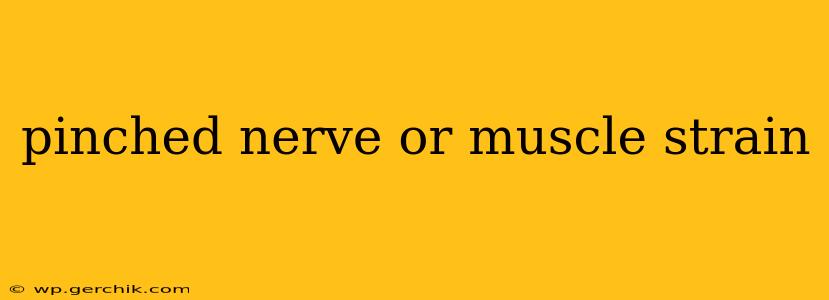Experiencing pain in your neck, back, or limbs? It's a common problem, and often the culprit is either a pinched nerve or a muscle strain. While both cause discomfort and limit mobility, understanding the key differences is crucial for effective treatment. This comprehensive guide will help you distinguish between a pinched nerve and a muscle strain, explore their causes, symptoms, and treatment options. We'll also address some frequently asked questions to provide you with a complete understanding.
What is a Pinched Nerve?
A pinched nerve, also known as a compressed nerve, occurs when surrounding tissues, such as bones, cartilage, muscles, or tendons, put pressure on a nerve. This pressure can disrupt the nerve's ability to send signals properly, leading to pain, numbness, tingling, weakness, or other neurological symptoms. The location of the pinched nerve determines the symptoms you experience. For example, a pinched nerve in the neck (cervical radiculopathy) might cause pain radiating down the arm, while a pinched nerve in the lower back (lumbar radiculopathy) can cause pain in the leg (sciatica).
What is a Muscle Strain?
A muscle strain, often called a pulled muscle or muscle tear, is an injury to a muscle or its tendon. This occurs when the muscle is overstretched or torn due to overuse, sudden movements, or trauma. Muscle strains range in severity from mild (a slight stretch) to severe (a complete tear). The symptoms typically involve pain, muscle spasms, swelling, and limited range of motion in the affected area.
What are the Symptoms of a Pinched Nerve?
Pinched nerves manifest with a variety of symptoms, depending on the location and severity of the compression. These can include:
- Sharp, shooting pain: This is often a hallmark of a pinched nerve, and the pain can radiate down the limb.
- Numbness or tingling: A pins-and-needles sensation in the affected area.
- Weakness: Difficulty controlling or moving the muscles supplied by the compressed nerve.
- Muscle spasms: Involuntary contractions of the muscles.
What are the Symptoms of a Muscle Strain?
Muscle strain symptoms generally present differently than those of a pinched nerve. Common symptoms include:
- Pain: A dull ache or sharp pain in the affected muscle, often worsened by movement.
- Swelling: Inflammation and swelling around the injured muscle.
- Bruising: In more severe cases, bruising may be present.
- Muscle spasms: Involuntary muscle contractions.
- Limited range of motion: Difficulty moving the affected muscle or joint.
How are Pinched Nerves and Muscle Strains Diagnosed?
Diagnosis typically begins with a physical examination by a doctor or physical therapist. They will assess your symptoms, medical history, and conduct a neurological exam to check reflexes, muscle strength, and sensation. Imaging tests, such as X-rays, MRIs, or CT scans, may be used to confirm the diagnosis and identify the underlying cause of the nerve compression or muscle injury.
What are the Treatments for Pinched Nerves and Muscle Strains?
Treatment approaches depend on the severity of the condition. For both pinched nerves and muscle strains, conservative treatments are often the first line of defense. These include:
- Rest: Avoiding activities that aggravate the pain.
- Ice: Applying ice packs to reduce swelling and inflammation.
- Over-the-counter pain relievers: Ibuprofen or acetaminophen can help manage pain and inflammation.
- Physical therapy: Exercises and stretches to improve flexibility, strength, and range of motion.
For more severe cases, additional treatments may be considered, such as:
- Corticosteroid injections: To reduce inflammation around the nerve.
- Surgery: In rare cases, surgery may be necessary to alleviate pressure on the nerve or repair a severe muscle tear.
How Long Does it Take to Recover from a Pinched Nerve or Muscle Strain?
Recovery time varies depending on the severity of the injury and individual factors such as age and overall health. Mild strains may heal within a few weeks, while more severe cases can take several months. Pinched nerves also have variable recovery times, depending on the cause and effectiveness of treatment.
Can a Pinched Nerve Cause Muscle Weakness?
Yes, a pinched nerve can absolutely cause muscle weakness. The pressure on the nerve disrupts its ability to send signals to the muscles, leading to decreased strength and control in the affected area.
Can Muscle Strain Cause Numbness?
While less common than with pinched nerves, numbness can sometimes occur with a severe muscle strain, particularly if the strain is near a nerve or involves significant swelling that compresses nearby nerves.
What is the Best Treatment for a Pinched Nerve?
The "best" treatment for a pinched nerve depends on the individual case. Options range from conservative approaches like rest, ice, and physical therapy to more interventional options such as injections or surgery. A healthcare professional will determine the most appropriate treatment plan based on your specific situation.
What are the Risk Factors for a Muscle Strain?
Risk factors for muscle strains include:
- Lack of flexibility and stretching: Poor flexibility increases the risk of muscle tears.
- Overuse: Excessive or strenuous physical activity without adequate rest.
- Poor physical conditioning: Weak muscles are more prone to injury.
- Improper warm-up: Failure to properly warm up before exercise.
- Underlying medical conditions: Certain medical conditions can weaken muscles and increase susceptibility to strains.
This information is for general knowledge and should not be considered medical advice. Always consult with a healthcare professional for diagnosis and treatment of any medical condition.
